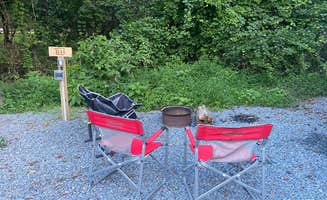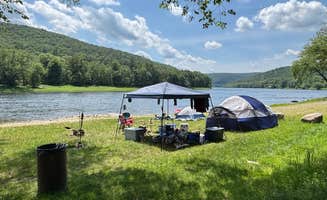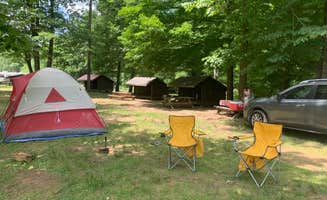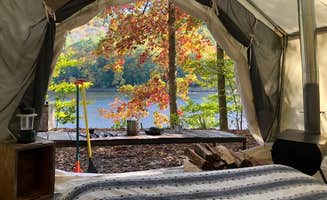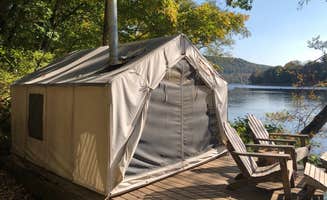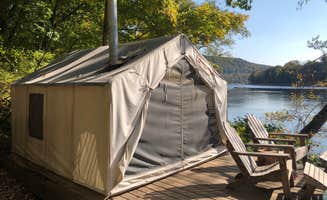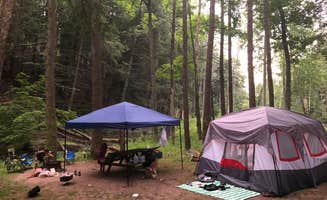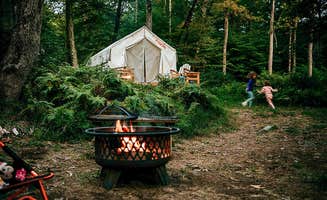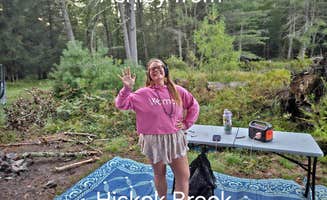The Millrift area sits at the northern edge of the Delaware Water Gap National Recreation Area, where the tri-state region creates diverse camping terrain ranging from 400 feet to over 1,800 feet in elevation. The Delaware River corridor features distinctive microclimates, with river valleys often 10-15 degrees warmer than surrounding highlands. Most campgrounds operate from April through October, though several offer winter cabin options during the December-March off-season.
What to do
Tubing and rafting adventures: Kittatinny Campground offers river activities as part of their camping packages. "The most beautiful campsite ever. Don't cheap out. Get the tubing package as well. Also love their camp store!" according to one camper. The rafting trips run from May through September, with peak season in July-August requiring advance bookings.
Waterfall exploration: Within 20 minutes of most campsites, you can access multiple waterfalls. A camper at Oakland Valley Campground notes, "My partner and I hit this campground up during the era of Covid and it was a cool place to stay. The location was on POINT!! Definitely a beautiful place to stroll along and enjoy the wilderness." Waterfall access requires short hikes ranging from 5 minutes to 2 miles depending on your starting point.
Fishing spots: The Delaware River offers multiple fishing spots for trout, smallmouth bass, and walleye. "The fishing here is decent, but its a shallow part of the river so in the summer months the fish seek deeper waters," explains a visitor at Namanock Island. Fishing licenses are required for both Pennsylvania and New Jersey waters, with daily permits available at local tackle shops.
What campers like
Private island camping: Namanock Island provides a unique boat-in camping experience with complete seclusion. A camper describes: "You totally feel that your party is alone out on the river, the entire world is yours and yours alone. There are no public interactions, (beyond the neighboring sites), on the river for miles, if not days." The island has four sites requiring canoe or kayak access, with no fees except for parking at river access points.
Riverside platforms: Several campgrounds feature elevated tent platforms that keep campers dry during wet conditions. At Stokes State Forest, a camper mentions, "Campsite was very spacious and had a platform where we were able to fit two tents. There was plenty of space on the site for more tents." These platforms typically measure 10x12 feet and are available at about 30% of the sites.
Winter cabin options: For off-season camping, High Point State Park Campground offers year-round accommodations. "The cabins are reasonably priced and well-appointed, if a bit rustic. The interior features are just what you'd expect for getting away for the weekend," notes one winter visitor. Cabins require reservations 7 days in advance and cost $55-75 per night, with most featuring wood stoves for heat.
What you should know
Cell service limitations: Most campgrounds have little to no cell coverage, particularly in river valleys. "No WIfi or cell service anywhere in campground but about 5 min down the road you can find it," reports a camper at Dingmans Campground. Reliable service typically requires driving to higher elevations or into nearby towns.
Weekend noise levels: Many campgrounds experience significant noise on summer weekends. "Busy campground no quiet time loud music till 3 in the morning. Very clean, workers very friendly and helpful but after dark no one around," says one Kittatinny Campground visitor. Weekday stays from Monday-Thursday typically offer quieter experiences with fewer crowds.
Weather considerations: The region experiences rapid weather changes, particularly in spring. A camper at Stokes State Forest explains, "We went in November when there was a light rain that turned into a thunderstorm with hail and sleet! It was certainly an adventure." The safest camping season runs from late May through early October, with more stable weather patterns and temperatures ranging from 55-85°F.
Tips for camping with families
Kid-friendly amenities: Slumberland at the River's Edge offers glamping tents with amenities that make family camping easier. A visitor shares, "The accommodations were top notch, with lights already on, and a table set, along with a grill, fire pit, and covered porch and canvas tent that housed two queen sized beds along with an electric stove and a woodstove." This eliminates the need to bring and set up bulky equipment with young children.
Animals and farms: Several campgrounds feature farm animals that children can interact with. One camper at Pleasant Acres Farm notes, "There were not many campground employees around. Good family fun though! Plenty to occupy the kids. Playground, hayride, animals to feed (goats, chickens, donkey and pony)." Most animal interactions are supervised during morning hours between 9-11am.
Swimming spots: Look for campgrounds with river beach access for safe swimming. A Dingmans Campground visitor explains, "The campsite has a beach on the river that you can go swimming in." River conditions can change rapidly, so morning swimming is typically safest before afternoon thunderstorms develop.
Tips from RVers
Site dimensions: Tri-State RV Park accommodates larger RVs but with limited privacy. "Pros: easy to find, right off the highway, full hookups, open year round, big, same day reservations, friendly customer service. Cons: highway noise, not pretty / not in nature, close spots, no privacy," explains an RVer. Most sites can handle up to 35-foot rigs, with a few accommodating 45-foot motorhomes.
Winter hookups: For RVers camping in colder months, some campgrounds offer winter water and electric. "Open during the winter. Easy on, easy off. Lots of pull through sites. Next to grocery store. CLEAN bathrooms, showers, laundry," notes a winter visitor to Tri-State RV Park. Frost-free water connections are available at select sites from November through March.
Level site selection: Many campgrounds in the hilly terrain have uneven sites. An RVer at Oakland Valley Campground explains, "Only reason I didn't give 5 stars was because the sites were a bit difficult to back into and unlevel." Requesting sites in advance with specific leveling needs helps ensure a better experience, as some locations have elevation changes of 4-6 inches across a single site.



